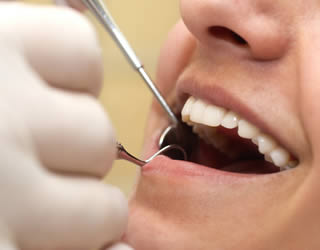Dry Socket Following Tooth Extraction

Monitoring your mouth after having a tooth removed.
Having a tooth extracted is a relatively common procedure. Although, with good home care, and regular visits to the dentist, we hope to minimise the need for this, there are occasions when an extraction might be the only viable option.
It is always best to keep your natural teeth wherever possible, but, where a tooth is severely decayed or has broken so badly that it is causing problems, extractions, and replacement by a denture, bridge or dental implant, is sometimes the best solution.
Although no one enjoys losing a tooth, the procedure itself is usually relatively straightforward. A local anaesthetic is given and then the tooth in question then manoeuvred gently until it is loosened from the bone holding it in place. It can then be removed from the socket. Some extractions may be more complicated, such as when the tooth has broken off at the gum line. This may require the services of an oral surgeon, but should still pose no real problems in most cases.
After an extraction
When a tooth is removed, as you might expect, the area will bleed. This is an important stage in the healing process. Naturally, the flow of blood needs to be stemmed, and this is done by placing a piece of sterile gauze over the hole left by the extraction. This helps to encourage a blood clot which both seals the hole and starts the recovery process. Occasionally, this may become dislodged, or start to bleed again. Patients of the Foxhall Dental Practice will be given additional gauze in case this happens, and this is, again, placed over the area until a clot has formed.
Care should be taken not to dislodge the clot, whether by poking it with the tongue or when cleaning the teeth. For this reason, it is important not to brush that area for some time, instead tipping a saline solution over it to help prevent infections. Full aftercare advice will be given at the time of the procedure.
Dry socket
Many patients may not have even heard of a dry socket, but there is little doubt that you will know about it if it happens to you. A dry socket occurs when the blood clot is dislodged and another one not formed. It essentially means that the nerves are exposed, and, as you can imagine, this is likely to cause a significant amount of pain. In some instances, using a dental mirror, you may also be able to see the underlying bone at the bottom of the socket as it is exposed.
Is it dangerous
In most cases, the gum would heal of its own accord in around two weeks. There is a risk of infection though if it were left to do so. The likelihood of anyone attempting this is fairly small though, due to the pain it would almost certainly cause.
What to do if you suspect you have a dry socket
If you are in significant discomfort following an extraction, you should always contact our Ipswich practice straight away, and not ignore it in the hope that it will go away. There may be other causes of discomfort, but a dry socket is one of the more likely ones. We will try to make a prompt appointment for you to minimise the length of time that you are in discomfort.
Fortunately, treatment for a dry socket is relatively straightforward. The first step is to ensure that the socket is clean. This will be done by irrigating it to remove any small pieces of food that may have become lodged in it. A medicated dressing is then placed into the socket. As this instantly covers the exposed bone, patients will often notice an almost instant relief once this part is done. Very often these dressings will be coated with pain relieving substances too, to lessen the discomfort even more.
You may need to have the dressing changed every few days until the socket is healed and you should also follow any advice that is given to you by your dentist at this time. Generally though, whilst a dry socket can be painful and inconvenient, it should cause no long term problems. You may also wish to consider additional pain relief in the form of your usual painkillers if you are particularly sensitive to discomfort.
Routine tooth care is carried out at the Foxhall Dental Practice with just as much care and consideration as the most complicated procedures. The vast majority of procedures pass with few problems. Occasionally though, complications such as a dry socket may occur, and when they do, you can be sure that we will act quickly and promptly to restore your mouth as quickly and as effectively as we can.
For both routine and cosmetic dentistry, we are here to help you to have the best experience possible. If you would like to find out more about what our Ipswich practice can provide for you, why not arrange a consultation with us by calling us on 01473 258396.
